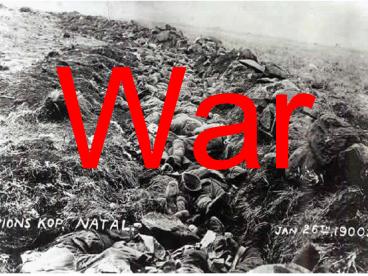War PowerPoint PPT Presentation
1 / 12
Title: War
1
War
2
Historical context
- The Boer War 1899-1902
- It began as a struggle between the British and
Dutch Boer settlers in South Africa for control
of diamonds and gold. The British eventually won
after they adopted a scorched earth policy,
whereby farms were burned and women and children
were rounded up in concentration camps.
Edgar Wallace was a medical orderly in South
Africa when the war began. Later he became a war
journalist.
3
Story of the poem
- We are behind the front line with the medical
corps at night. An injured soldier hit by a
rebound bullet is carried into the tent as the
war carries on noisily in the background. The
surgeon, working by a dim light and with limited
medical supplies, tries to patch up the soldier
but he dies. The surgeon tells the orderly to
clean the knifeready for the next victim of war.
4
War!
Why do you think Wallace writes the word war in
italics with a capital letter and an exclamation
mark each time?
- And its War! Orderly hold the light.
- And its War! But the part that is not for show.
- And its War! Orderly hold his hand.
- And its War! And a very unhealthy trade.
- And its War! Orderly take it out.
- But its War! And - Orderly, clean the knife!
Wallace was a war correspondent. War! is
written like a newspaper headline, italicised and
with an exclamation mark. However, this is
somewhat ironic as the focus of the poem the
difficult conditions of the medics and the
victims of the war did not and do not tend to
make headlines. Its battles, heroes and the
politics of war that were and are usually
reported. Also, the way the word is written makes
it sound angry and loud, just like war itself.
5
(No Transcript)
6
An orderlys life.
Comforted the injured
Work in difficult conditions without much light,
medical supplies
Told what to do ordered about
Given instructions under pressure
- Orderly, hold the light.
- You can lay him down on the table so.
- Easily gently! Thanks you may go.
- Orderly, hold his hand.
- Im not going to hurt you, so dont be afraid.
- A ricochet! God what a mess it had made!
- Orderly, take It out.
- Its hard for his child, and its rough on his
wife. - There might have been sooner- a chance for his
life - But its War! And orderly, clean this knife!
- Wallace was an orderly he has first-hand
experience of what he describes. From the
dialogue in the poem, what can we learn about
what life was like for an orderly in the war?
Had to deal with death and corpses as a matter of
routine
Appreciated acknowledged but quickly dismissed
and expected to get on
Witnessed horrific sights
Prepare for the next wounded man, be expected
just to get on with it.
7
Quotation cards
8
Task one match the cards to the meaning
9
Task two sounds
- Which quotations bring out the sounds of war and
what the medics would have heard? How do the
sounds add to the atmosphere and drama of the
poem?
10
Task three - language
- Which quotation(s) includes
- Onomatopoeia
- Metaphor
- Assonance
- Ironic humour
- Emotive word
- Impersonal pronoun
- Rule of three
- pathos
11
Task four best fit
- Which quotation would be best used to support
these points - a) War is futile.
- b) War is sometimes glamorised.
- c) We can become desensitised to the horrors of
war. - d) The medics had to get used to dealing with
death and couldnt get personally affected by
death. - e) Wallace powerfully and emotively describes the
wounded soldier.
12
Task five diamond 9
Which quotation best helps us to understand the
message of the poem?
- Create a diamond 9 with the most useful quotation
at the top and the least useful at the bottom.

